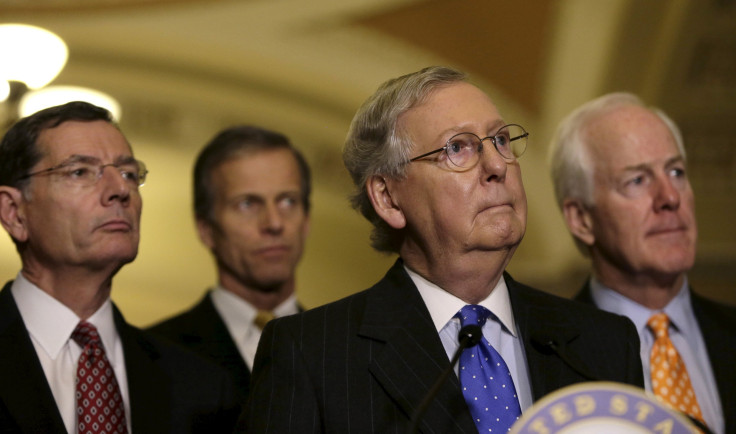The Hypocrisy Of Mitch McConnell: Republican's Latest Position on 'Thurmond Rule' To Block Obama Supreme Court Nominees

The Mitch McConnell of 2016 is singing a pretty different tune than he has in the past regarding a president’s job to nominate a Supreme Court justice when there is a vacancy and the Senate's role in approving the nominee.
Decades ago, just years out of law school and with a little experience as a legislative assistant in the Senate, McConnell argued that the president is elected by the people to carry out a program that may include altering the ideological makeup of the Supreme Court. Just eight years ago, the future Senate Majority leader argued for the president’s absolute right to nominate judges to federal courts. But now, even before Democratic President Barack Obama has tipped his hand as to whom he'd nominate to replace the recently deceased Justice Antonin Scalia, McConnell sounds hell-bent on blocking that nominee.
McConnell and his fellow Republicans in the Senate are invoking a rule — or, rather, a tradition in the legislative body that is not grounded in the Constitution — that establishes precedent for blocking judicial court appointees in the final six months of a president’s term. That rule, known as the “Thurmond Rule,” was adopted during Lyndon Johnson's late-1960s administration in retaliation for the passage of the Civil Rights Act to block a Supreme Court nominee.
“The President is presumably elected by the people to carry out a program and altering the ideological directions of the Supreme Court would seem to be a perfectly legitimate part of a presidential platform,” McConnell wrote two years later for a law review article in 1970. In that article he argued that a president wouldn’t nominate a judge with an extreme ideological bend and therefore the Senate should leave ideological discretion to the executive office.
This is from a law review article written in 1970 by one A. Mitchell McConnell, Jr. https://t.co/Ipx2Imct6x pic.twitter.com/0I5XrFUR90
— Paul Waldman (@paulwaldman1) February 15, 2016
He wasn’t to become a senator for another 15 years and much has changed in American politics, but he was making a somewhat similar argument 48 years later when former President George W. Bush, a Republican, was trying to fill federal court vacancies in the final months of his presidency (and, incidentally, he also mentioned the president’s absolute power to appoint judges in 2005).
“Our Democratic colleagues continually talk about the so-called Thurmond Rule, under which the Senate supposedly stops confirming judges in a presidential-election year,” McConnell said on the Senate floor in 2008. “The seeming obsession with this rule that doesn’t exist is just an excuse for our colleagues to run out the clock on qualified nominees who are waiting to fill badly needed vacancies.”
But, to hear McConnell today with a Democratic president hoping to fill a vacancy, that rule does seem to exist. The Thurmond rule has traditionally only applied to the last six months of the presidency —which, for Obama, won’t be until late June. While he once argued for leniency with the Thurmond rule, McConnell now says he’d be shocked if the president nominated a justice 11 months before the end of his presidency.
© Copyright IBTimes 2024. All rights reserved.






















